 Image search results - "dancing" Image search results - "dancing" |
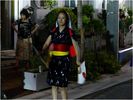
Eisa dancing is performed on the streets at night in every village on Okinawa during the three days of Obon, late in August. Here a young lady dressed in traditional Okinawan yukata (an informal kimono) marches while waving Rising Sun paper fans.Photo copyright 2009 Michael Lynch.
|
|
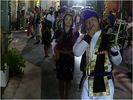
During each brief pause in the Eisa music, the men make a loud whistling noise that is distinctly Okinawan. All photos copyright 2009 Michael Lynch.Photo copyright 2009 Michael Lynch.
|
|
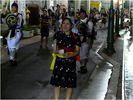
The Eisa dancers are all unmarried men and women between 20 and 30 years of age. The small handheld drums, known as Panraku, have the traditional symbol of Okinawa painted in gold on them.Photo copyright 2009 Michael Lynch.
|
|
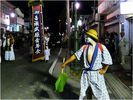
The Buffoon, Clown, or Town Drunk is a man who zig-zags through the line of dancers to the beat of his own drum, entertaining everyone and chasing evil spirits away.Photo copyright 2009 Michael Lynch.
|
|

Here the Buffoon (called Gajangani) can be seen going in the opposite direction of all the other male dancers and waving a banana leaf. Some clowns carry bottles of sake and try to get bystanders to drink with them.Photo copyright 2009 Michael Lynch.
|
|
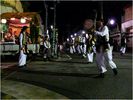
Each team of Eisa dancers has its own band riding in the back of a straw roof-covered truck. Sanshin (3 stringed instrument) players sing and play Okinawan folk music accompanied by CD’s blasted over a loudspeaker system. Photo copyright 2009 Michael Lynch.
|
|
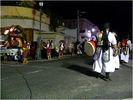
Different color yukata and uniforms of the dancers are worn, depending on which district or village they represent.Photo copyright 2009 Michael Lynch.
|
|

The large banner or flag carried on a bamboo pole is known as Hatagashisa and also represents a village or district. Each has their own unique design and the team takes pride in displaying it as a symbol of strength and prosperity for their hometown.Photo copyright 2009 Michael Lynch.
|
|
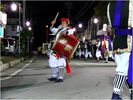
The large drum used for marching is slightly smaller than a Taiko and is called an Odaiko drum. The drummer in this photo is the only female player of this team to play such a large drum and she smiles and beats it enthusiastically.Photo copyright 2009 Michael Lynch.
|
|
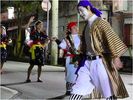
The brown and beige garment worn by this Buffoon is hand woven clothing called Bashofu. It is made from the fiber of banana plants. There may be two or three of these characters with each Eisa group skipping and weaving through the dancers as if they...The brown and beige garment worn by this Buffoon is hand woven clothing called Bashofu. It is made from the fiber of banana plants. There may be two or three of these characters with each Eisa group skipping and weaving through the dancers as if they weren’t there. Photo copyright 2009 Michael Lynch.
|
|
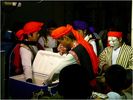
Here a group of men reach into a cooler for some refreshments while on a quick break from dancing. They will pile on trucks and move to the next location, performing Eisa dances well past midnight at every street, in every village for miles around.Photo copyright 2009 Michael Lynch.
|
|
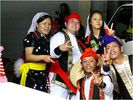
For their parting shot, these Eisa dancers couldn’t resist flashing the Peace sign along with their smiles for the camera. Photo copyright 2009 Michael Lynch.
|
|

The 16th Kitamachi Awa Odori was held on July 26, 2008 from 6 pm to 8:30 pm. Kitamachi is a small neighborhood near Tobu-Nerima Station on the Tobu Tojo Line.
|
|

They danced on the main shopping streets called Kitamachi shotengai (pictured here) and New Kitamachi shotengai. Just few minutes walk from the train station. きたまち商店街
|
|

After a few speeches and a "tape-cut" ceremony, the festival began at 6:30 pm.
|
|

Twenty-three dancing and non-dancing troupes participated. This is somewhat small compared to bigger Awa Odori dances in Tokyo, but the enjoyment and enthusiasm of the dancers and crowd were top-class.
|
|

One group was from the local junior high school.
|
|

There were about 1,400 dancers and about 70,000 spectators lining the streets.
|
|
|

Junior high school dancers dressed in yukata.
|
|

School baseball team, Kitamachi Faiyers. No dancing.
|
|
|
|
|
|
|
|
|

Would you believe a karate group? They did not dance. Just punched and yelled their way through. Kitamachi Awa Odori, Nerima, Tokyo 極真空手連
|
|

I much prefer the women dancers.
|
|

So photogenic, like a crane in flight.
|
|
|
|

Daikon-ren from Nerima-ku.
|
|
|

These kids were very good at the taiko drums.
|
|
|
|
|
|
|
|
|
|
|
|
|
|
|
|

Dancing in formation.
|
|
|

Aoi Shin-ren, one of my favorite Awa Odori troupes. 葵新連
|
|
|
|
|
|
|
|
|
|

Kitamachi Awa Odori, Tokyo 写楽連
|
|

Kitamachi Awa Odori, Tokyo
|
|
|
|

Takara-bune-ren 宝船連
|
|

She loved to pose for photographers.
|
|
|
|
|
|

They were hoppin'
|
|
|
|

Awa Odori dancer
|
|

All the dancers' faces were glistening with perspiration.
|
|

Kitamachi Awa Odori, Nerima-ku, Tokyo
|
|
|

Kitamachi Awa Odori Dance, Nerima-ku, Tokyo きたまち阿波おどり
|
|

Nice formation.
|
|
|

They know how to look good.
|
|

For the last number, the finale.
|
|

Quite spectacular finale performance by this troupe called Hyottoko-ren. ひょっとこ連
|
|
|
|
|
|
|
|
|
|
|